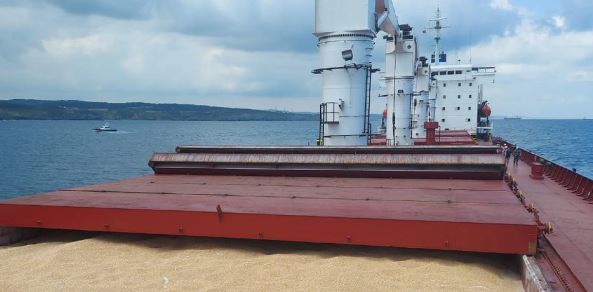Russia reiterates commitment to transfer 262,000 t of fertilizers at no charge to poorest countries
Addis Ababa, January 25, 2023 (FBC) – In a press release sent to FBC, the Russian Embassy in Addis Ababa said that, following the Black Sea Initiative, 668 vessels with 18,224,860 tonnes of food on board have now left the ports of Odessa, Chernomorsk and Yuzhny as of January 20, 2023.
“Their cargo consisted of 46.1 percent corn feed, 5.9 percent grist, 5.5 percent rapeseed and other feed crops for cattle. The share of wheat amounts to a mere 27.57 percent, and yet the UN bulletin lays special emphasis on it,” according to the Press release.
“The goal is clear – to present “correct” humanitarian figures on the share of recipient countries that are developing economies (allegedly 64 percent) and that for some reason include such states as Israel, South Korea and the Gulf monarchies that obviously have no problems with economic development or food security.”
“The real geography of the Ukrainian food recipients is as follows: high-income countries (the EU, Britain, etc.) received 8.6 million tonnes of cargo (47 percent); countries with above-average incomes (China, Jordan, Malaysia, etc.) received 6.1 million tonnes of cargo (33 percent) and countries with below-average incomes (Bangladesh, India, Indonesia, Pakistan, etc.) got 2.9 million tonnes (16 percent). Only 551,527 tonnes (3 percent), including 396,169 tonnes (2 percent) carried by UN WFP-charted vessels, were sent to needy countries (Ethiopia, Somalia, Yemen, Sudan, Afghanistan and Djibouti).”
“Indicatively, the share of these countries in the overall figures is going down. In the first 120 days of the initiative, it was almost 4 percent and now it is 3 percent. It is important to note that this was the reason why the UN employees quickly transformed the Black Sea Initiative from a humanitarian into commercial one and refused to publish information about the cargo recipients under the pretext that it was a commercial secret.”
“Russia has informed UN officials about its position on this issue many times and in detail, that is, the transshipment of ammonia was to begin as part of the efforts to carry out the Black Sea Initiative. No additional agreements regarding this issue are required. The technical capability to restore the ammonia line does exist. The companies in charge of its maintenance are also ready to resume work.”
“The UN officials, who are vigorously calling for increasing grain export from Ukraine, are doing nothing to resolve this issue. They refer to some talks, although it is not clear who is taking part in these talks and what they concern, since no representatives from Russia are involved in any such thing.”
“At the very end, the UN bulletin devotes literally one paragraph to the second document on normalising Russian exports of agricultural products and fertilisers, which was signed in Istanbul on July 22, 2022. It does not mention that the two agreements are parts of the same package proposed by Antonio Guterres and are designed to work in tandem.”
“Especially revealing in this respect is the implementation of our proposal to transfer 262,000 tonnes of fertilisers at no charge to the poorest countries. They are now blocked in Latvia, Estonia, Belgium and the Netherlands. We sent an official address to the UN Secretary-General in this regard on September 7, 2022, providing all the necessary information.”
The Embassy elaborated that the first and only consignment of 20,000 tonnes of these products was sent from the Netherlands to Malawi on November 28, 2022. Russia volunteered to bear all expenses to transport and deliver the cargo and paid $200,000 to the UN WFP for “mediation services.” Meanwhile, this is a humanitarian mission aimed at helping needy countries on the eve of a new planting season, the press release says.
“The fertilisers arrived at the port of Mozambique on December 28, 2022 and should now be on the way to Malawi. Thus, it has already taken almost five months to send a small part of the free fertilisers under UN aegis, and the cargo still has yet to reach destination. We can only guess how much time it will take to unblock and deliver the remaining 242,000 tonnes of products.”
“If the implementation of this strictly humanitarian initiative meets with such difficulties, the UN cannot be said to have helped normalise our exports of agricultural products and fertilisers. Talk about the threats of hunger and global food security is just a cover for servicing the commercial contracts of Ukrainians and the economic interests of the Western beneficiaries. This is accompanied by fact juggling and attempts to distort the real situation as regards meeting the acute needs of African, Asian and Latin American countries,” the Embassy added.

